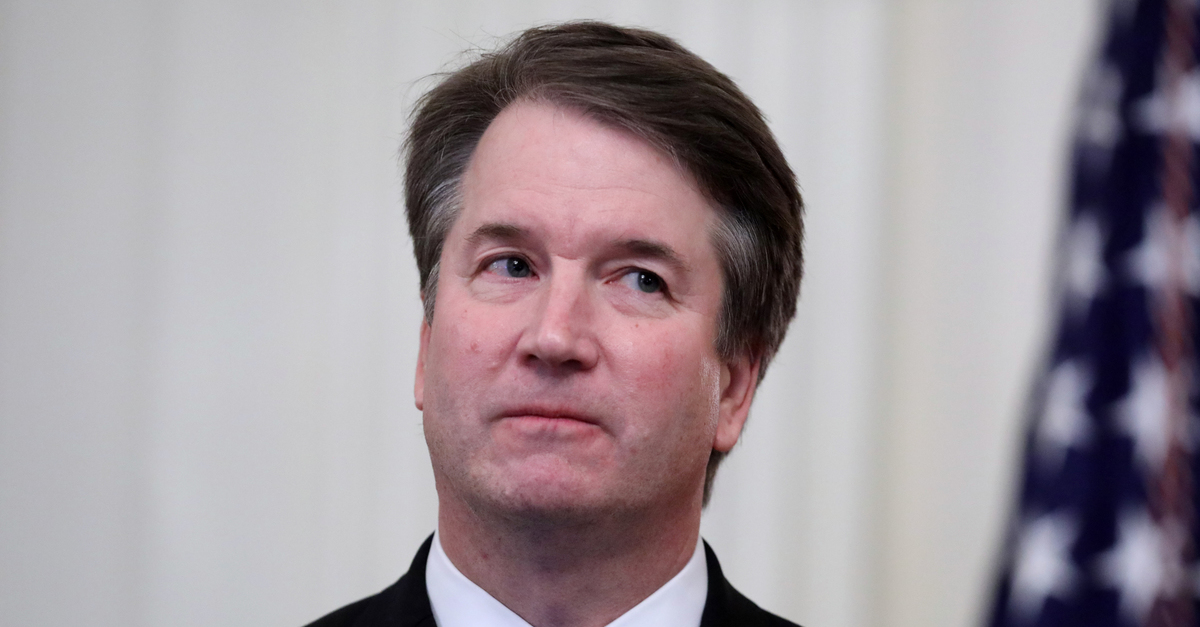
The brand-new liberal court-packing group Take Back the Court won a media coup last week. Its letter urging U.S. Supreme Court Justices Brett Kavanaugh and Samuel Alito to recuse themselves from three LGBT-related cases was widely covered by LGBT and mainstream outlets. The publicity win for Take Back the Court and its agenda is clear, but so is the hypocritically partisan nature of its attack on the conservative justices.
The Claim
According to the “fairly radical” group, Kavanaugh and Alito raised “serious concerns about” their “impartiality” after appearing in a photo with National Organization for Marriage (NOM) president Brian Brown. Brown’s socially conservative group has filed amicus briefs in three LGBT-related cases which the Court is hearing in its current term.
Take Back the Court Director Aaron Belkin told Law&Crime that the justices’ “inappropriate conduct underscores the importance of judicial reform including expanding the Court.” He accused the justices of “flaunting that they have the power to disregard ethics, decency and fairness.”
Take Back the Court’s concern about the Court’s cases is no surprise; its leadership includes top LGBT advocates such as Belkin and Freedom to Marry founder Evan Wolfson. Their claim that a single photo negates impartiality by Alito and Kavanaugh, however, is historically inconsistent and patently partisan.
Belkin vs. Attorneys
Almost five years ago, Justices Ruth Bader Ginsburg and Elena Kagan officiated same-sex ceremonies. They did this just months before joining a majority of the Court in ruling that same-sex couples could legally marry. A Google search indicates that Belkin and Wolfson did not call for their recusal.
When I e-mailed Take Back the Court whether Kagan, Ginsburg, and other justices who redefined marriage in 2015 should recuse themselves today because their impartiality is clearly in question about LGBT issues, Belkin replied with the following:
The problem with the justices’ conduct is very specific: Kavanaugh and Alito posed for a photograph for social media with a party who has filed amicus briefs in cases currently under consideration. As we noted in our letter, this would likely violate the Code of Conduct for federal judges, if that code applied to the Supreme Court.
Belkin’s claim ignores that justices are celebrities who appear in photos all the time – and they speak to philosophically-aligned groups almost as frequently. As law professor and former Federal Elections Commission Chairman Brad Smith put it to me, “Justices speak to all kinds of groups and have all kinds of friends and professional acquaintances. Justice Ginsburg routinely praises and appears at events for the left-wing American Constitution Society – is she to be recused from cases involving an issue on which the ACS has taken a stand?”
Trey Mayfield, a constitutional litigator who has argued in front of the U.S. Supreme Court, agreed.
“The federal statute governing recusal states that a justice ‘shall disqualify himself in any proceeding in which his impartiality might reasonably be questioned,’” Mayfield said. “No rational person can believe that a person merely appearing in a photo with other people means those people collectively share the same views on a given subject.”
“’Impartiality’ means that a justice will consider a case solely on its merits rather than on an outside influence,” Mayfield continued. “It doesn’t mean that a party is entitled to have a justice recuse himself because it doesn’t like the justice’s personal views, affiliations, or method of legal analysis. If that was the standard, no one would ever be able to serve as a justice.”
Other Rebuttals
Regarding Brown and NOM’s amicus brief, there is no evidence he represented NOM to the justices. It was Brown’s role in the Catholic group International Organization for the Family (IOF) which brought Brown, a Catholic cardinal, the justices, and the German Catholic activist Princess Gloria together for the Court photo. Alito and Kavanaugh are Catholic.
Additionally, Take Back the Court noted in a recent report that Kavanaugh recused himself twice in 2018. Since he was on the Court for less than three months that year, he is clearly willing to recuse himself as he sees necessary.
Finally, compared to a photo, Ginsburg’s founding of a department at the liberal ACLU and Kagan’s decision to sit in on Affordable Care Act decisions despite having been Solicitor General in the Obama administration are far more serious … if we are going to be taking partisan potshots about recusal.
Publicity Over Country
The evidence is clear that this situation doesn’t call for recusal. It is simply the same recycled partisanship which led Democrats to oppose war under Bush, ignore it under Obama, and support it under Trump. It’s the same partisanship which led Republicans to spend like sailors under Bush, oppose high debt under Obama, and ignore debt under Trump.
Politics is partisan, and the best publicity tends to win over the best policies and principles. Take Back the Court’s ethically empty political victory is just another example. No wonder we’re self-destructing as a country.
Dustin Siggins is a publicist and a former political journalist. He left politics because he was burnt out on watching politicians and activists lie to voters and donors.
[Image via Chip Somodevilla/Getty Images]